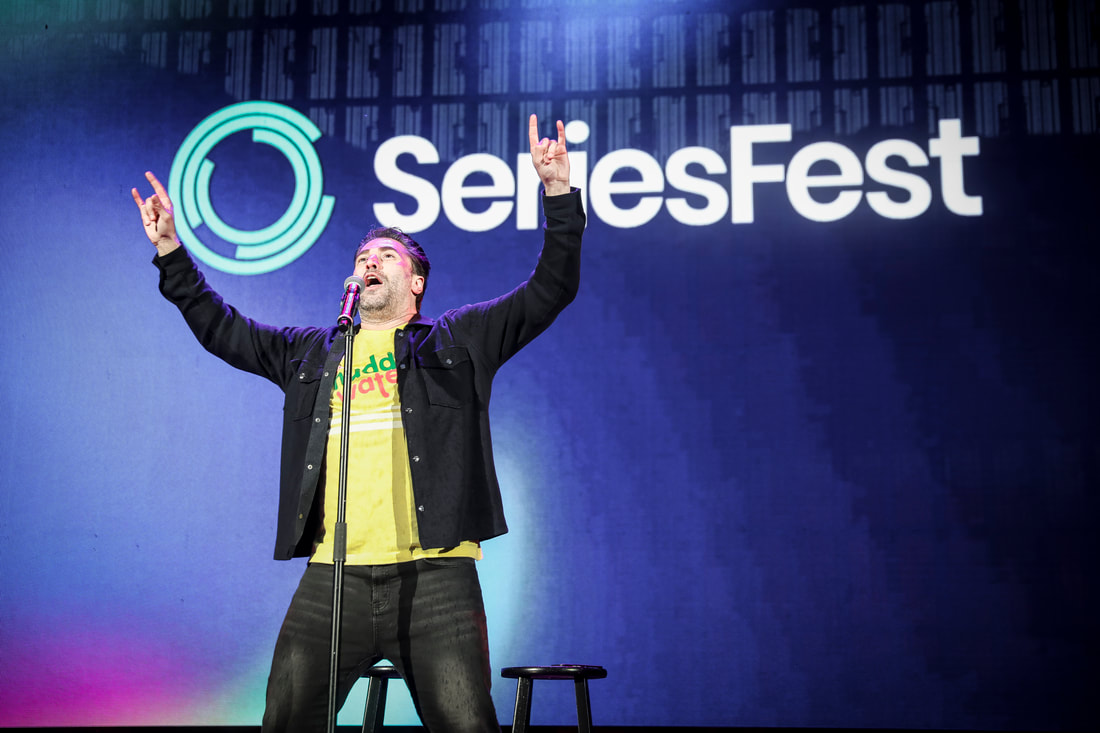 Adam Ray Performing at SeriesFest Season 9’s ‘A Night of Comedy’. Photo by Marc Piscotty for SeriesFest. Adam Ray Performing at SeriesFest Season 9’s ‘A Night of Comedy’. Photo by Marc Piscotty for SeriesFest. Comedian and Actor Adam Ray is one busy creative. For he’s popped up in a bevy of television shows and films, in between taking the stage to make us laugh with his crisp stand-up comedy routine, and we at NTG were fortunate enough to sit down with Adam before ‘A Night of Comedy’ got underway at Red Rocks in the rain, as part of SeriesFest Season 9, to discuss his love of comedy, and more. Adam Ray: Nerds That Geek. What’s that all about? John Betancourt: It’s about celebrating pop culture. We just geek out about pop culture, day, and night. Adam Ray: So, what’s the nerdiest shit that you, John, geek out on the hardest? John Betancourt: Star Trek. All day, every day. Adam Ray: My buddy Piotr Michael. They're doing a video game, right? He just announced on Instagram. He's gonna play Spock. That's kind of a big deal. John Betancourt: Oh man. That’s a huge honor. I’m going to have to play that and geek out about it for sure. Adam Ray: So, I saw the Star Trek movie where there was like a whale. John Betancourt: Yes! The whale movie. Adam Ray: That was good! John Betancourt: It really was! It’s one of the most popular ones. Adam Ray: Nimoy’s a beast, man. Nimoy’s a beast. But anyway, this is about you, John. John Betancourt: Oh, yeah. I guess I should ask some questions! So, let’s talk about comedy. Obviously, it’s a big part of your life. What is it about comedy that still excites you? Adam Ray: Oh, man. I started comedy. Because, you know, as a young kid, man, I got teased a lot for weight, and other bullshit. And then I started to make people laugh, not just my friends, but like publicly at school to like a bigger audience of strangers and kids and then I was looked at as the funny kid and not the fat kid. So, like, it saved me in that regard. And also, it feels amazing to make people -- to know that you're doing something that now feels pretty effortless, to feel good and can change your day. And some of the messages you get from people from shows or videos. It's crazy, and it's just it's selfishly, it's really fun. I got to do some of the coolest things in my life because of comedy. And, you know, meeting 78-year-old Joel McHale is like… (Laughter from Adam and John) don’t let him tell you he's younger because he's not! He looks great because he washes his face. But he’s uh… he’s a guy I looked up to as a kid and he was on a show called Almost Live! when I was in Seattle that I watched. It was like SNL for Seattle, and I watched being like… “Dude”. I mean I was so enamored by this guy this cast and they're not famous. They’re famous to us. But I was like, it gave me like it just a boost as far as like, “Oh wow, there's a lot of room for a lot of people in this.” And then once I got to know him, and he told me his story now he's you know, a household legend and so, it’s an extra treat to be in this show, and comedy truly cures. And I think closing SerieFest with a show here is like the perfect way to do it. Because you've seen a whole week of people getting to you know, really toot their horns, and show off their skill sets from all over the world and, and now we're at one of the most iconic venues of all time to do… to do dick jokes where The Beatles played. “Let it Be” is… is not going to be lost on me. This interview has been lightly edited and condensed for clarity.
0 Comments
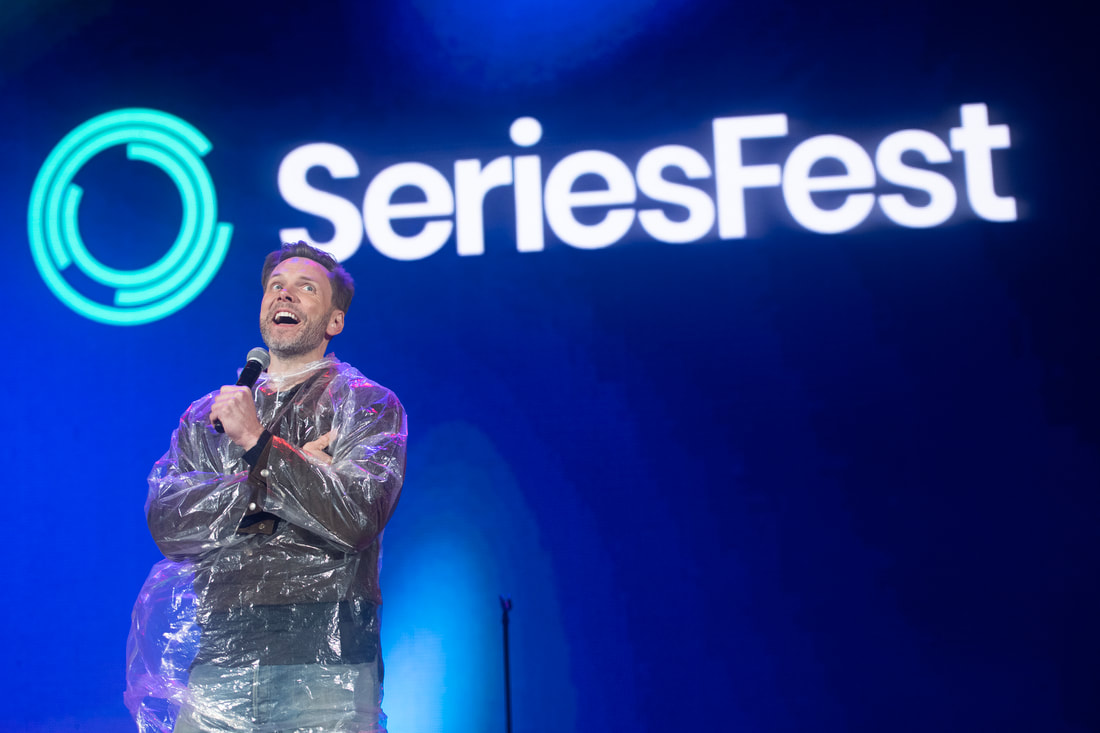 Joel McHale Performing at SeriesFest Season 9’s ‘A Night of Comedy’. Photo by Tom Cooper for Getty Images and SeriesFest. Joel McHale Performing at SeriesFest Season 9’s ‘A Night of Comedy’. Photo by Tom Cooper for Getty Images and SeriesFest. It is definitely safe to say that Joel McHale a true icon of the comedy world. Courtesy of his many memorable roles on comedic television shows, including Animal Control, which was recently renewed for a second season. And we here at NTG had the distinct honor of speaking with Joel about that renewal and more at the very rainy, ‘A Night of Comedy’, at SeriesFest Season 9. John Betancourt: First off, congratulations on Animal Control’s second season renewal! Joel McHale: Yeah, fuck. I can’t believe it. John Betancourt: Well, it’s just amazing, and I have to ask, what does it mean to you to get that second season order? Joel McHale: Well, first of all, Fox has been so insanely supportive of the show. And I can say this now, because it's not the same… same administration (laughter), but it was not the case at NBC when we were doing Community. So, I keep telling them, I'm like, I feel like this luxurious version of like Oliver Twist, where I just keep stealing stuff, and they're like, “You don't have do that anymore. It's okay, we're gonna take care of you.” And we're very lucky because they took care of the show. The cast is great. The writing is great. And I think the setting, we shoot it in Vancouver and set it in Seattle, and uh… I was raised Catholic, so I think everything's going to go badly all the time. And so, I'm always like, “Something's gonna go wrong.” So, I know, network comedies are hard to get up, hard to even get made. And then to get out, you know, to make a pilot, or just, get out of your first season. I can't believe, thank you, God, so I can't believe we're gonna do it again. And obviously, with the WGA strike, we don't know when it's going to be, you know, the writers need to be paid, absolutely, the whole system has to change. So, we're in for the long haul. And thank God Fox is behind it. And you know, I’ll be out on the picket lines. John Betancourt: Yes, absolutely. Have to support the Guild. Joel McHale: Yeah, they end up getting the short end of the stick, and they've fucking invented the things. It’s like, don't pay the guy who invented the carburetor. Why not? Maybe we should? Nah let's not pay that guy that changed automobiles forever. John Betancourt: Absolutely. Now, looking ahead to tonight, comedy has obviously been a huge part of your life, what is it about comedy that still energizes you? Joel McHale: Well, I mean, as a child, that's all I did. Well, my dad is very funny. And my brothers are very funny. So, we thought we were funny. And that was the language of the house. Now, I love doing drama as well believe me. So, if you want to hire me for drama, that's great. But for me, it was always survival because I couldn't read. And I still can't to this day. That's why thank God for Audible. So, I think I made up for it with telling jokes. And I just remember thinking like, “Man, if I am gonna do this for the rest of my life? I'm gonna be the happiest person on the planet.” Because I still can't believe that somebody pays me to tell a joke or say something out loud on camera or get to come to Red Rocks. Stand on stage and tell jokes. I'm getting all like, I’m sure I’ll burst out crying during it or something. John Betancourt: So, it must mean a lot to you to be able to do this in front of such a large audience. Joel McHale: Yeah, well, if they don't get electrocuted, yes. John Betancourt: Yes, all death aside. Joel McHale: I mean, if no one drowns, then I'll be very happy. It's raining out there, folks. Everyone kept saying, “I don't know Colorado crowds. You'll see, everyone's gonna show up.” And I was like, “That would not happen in Los Angeles.” We have farmers’ markets in Los Angeles, and if it rains, no one shows up there. Like, I would rather be dry, than eat. I'll just not go to a farmers’ market. You know, I grew up in Seattle, so we literally have Bumbershoot, which was like bring your umbrella, because it’s gonna rain. So, I can't believe it. It’s a beautiful setting. It’s literally one of the most iconic stages on the planet. And I get to say that I stood on there… for 15 minutes. It’s crazy. This interview has been lightly edited and condensed for clarity. 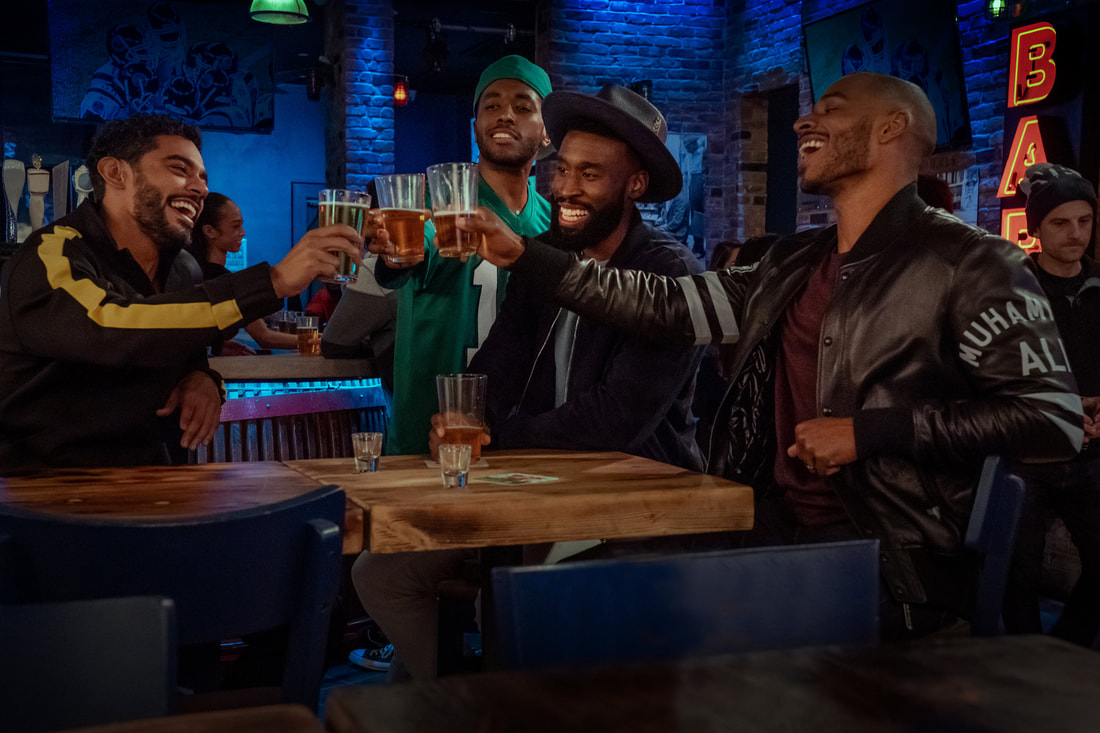 Tosin Morohunfola and Jay Walker are a pair of talented, accomplished, and downright busy actors. Having graced our television screens often over the past few years. Currently they star as Ola and Jason on the STARZ series, Run the World, and we here at NTG were fortunate enough to sit down with both gentlemen to discuss the upcoming second season of the show. John Betancourt: What does it mean to each of you, to be part of such an important and relevant show? Tosin Morohunfola: It's great. I mean, this is like the modern, Living Single, this is like the modern Girlfriends, this is the modern, this is the black Sex in the City. Like, it's an iconic show about black women in Harlem, taking the world by storm, romantically, ambitiously, and doing it… fashionably. So, it's just beautiful. And it's fun. And it's funny, and it's real. And it's now, I just, I love being a part of it. It's a legacy making show, I think. Jay Walker: I love that. I love that. I love the humanity of the show, because we get to see so many different, like you said, ambitious women and men struggling to figure things out. And that's, that's really what life is, is we do our best. And things often don't go the way that we expect them to. And in the course of figuring out how to proceed, we learn what's important to us. And we learn a lot about ourselves through adversity. And being able to explore all of those things, especially on a black TV show like this is so cool. To be able to see that represented on screen. John Betancourt: Now this is a show where everyone is constantly in motion and constantly searching for something greater. What would you say your characters are searching for in season two? Jay Walker: Jason is… Jason… he knows that he's in love with Renee. That… that has never changed. What he's searching for is… what is his purpose, if that is not an option? What does his life look like, without his partner? Who has been his partner since college? Who is he? He's really trying to figure out who he is as a man without Renee. So that's… he's got a big magnifying glass. Because it's a… it's a very serious search. Tosin Morohunfola: And Ola is just searching for a woman that doesn't cheat. That's really all he's looking for. (Laughter from everyone) If he could just find one honest woman that would be all he… no. Ola is… is definitely, you know, outwardly he is searching for a true and genuine reconciliatory apology from Whitney. She cheated before they were supposed to get married. And he's still deeply hurt about that. But I think inwardly, and I don't know if he even fully knows this himself, but he needs to, to search for the part of him that doesn’t reduce someone's importance to one action. Doesn't reduce the most important woman and person in his life down to her worst mistake, but instead continues to elevate her to her highest attributes. So, I think that's an inner journey that he's just beginning. And yeah… I wish him the best. (More laughter) John Betancourt: Of course, this show has so much depth to it, I was wondering what kind of deeper message or theme you hope the audiences takes away from this season. Tosin Morohunfola: Well, I mean, one thing that's great is this, this show, is centered around these three women and their sisterhood and their bond. And that is the glue that connects and sustains you through the ups and downs of, of your pursuits of your romantic life, of your ambitions, of the way life can hit you down. But the thing that I think this season does an even better job of is upholding the brotherhood that the men have as well. And that you know, we have found a friendship me and Jay, Ola and Jason, have found a friendship. And it has grown over the course of this season and in between seasons and seeing that depicted, seeing that male vulnerability shared from black men, between black men and being able to be transparent and honest and hurt, and still be strong and masculine. That depiction is unique, that depiction is also what makes our part of the story like, addictive, because it's something that you don't see too often on television. Jay Walker: Yeah, I mean, just to jump on that, I think you basically covered what I also think is one of the coolest things about this season. But it is making it okay for men to explore their feelings, and be honest with their feelings, and talk to their bros about their feelings. And to have that not be a sign of weakness but a sign of strength. The fact that we can kind of help redefine masculinity, by shining a light on that and showing how valuable it is to have those conversations that suck, they suck, they hurt, but we need to have them in order to grow, in order to not take that hurt out on other people that we care about. And I think showing that as a potential way forward for people is incredibly cool. John Betancourt: Last question I have for you gentlemen today, what are you most proud of when it comes to your work on this show? Tosin Morohunfola: This is not the most outward thing, like people can't see this as much. But I feel like in season one especially, I felt like I exercised a kind of like, really rigorous discipline as an actor, discipline to my craft, discipline to my approach. I kind of like feel like I finessed it and really honed in so much that nothing else mattered. And I was so proud of myself. It's one of those things that I don't know how much the audience sees it, but I have an internal pride about it. And then season two, relaxing into a little bit more of flow. It's hard to explain, but just like, you know, at the end of the day, we're actors, and we're telling stories, and we want to do it in a way that has the most integrity, and but also has a flow to it. And I felt proud of that. Jay Walker: I mean, there's definitely in both season one and two, what helps the discipline aspect because I agree with you 100%, I felt the exact same way, especially season one, because it was like, “Oh, we're doing… first of all, we're doing sex scenes? In this?” This is the first time that I've ever done that. So yeah, like wanting to be in good physical shape? Tosin Morohunfola: Yeah. We gotta look good. We gotta look good. Jay Walker: That was… that was a lot. We did a whole lot of work, but just needing to be in that mindset. And then following through and delivering and making. Having made it work. I was like, “Okay, that's something. I can do that now. I proved to myself now that I'm capable.” And then season two was like Tosin said, you could relax into it more. It was like, “Okay, this is where we live.” And I'm very proud of the fact that that it could feel normal, in a way. It was like, “Okay, this is just this is this is where we're operating now. Yeah, this is where we're operating.” This interview has been lightly edited and condensed for clarity. 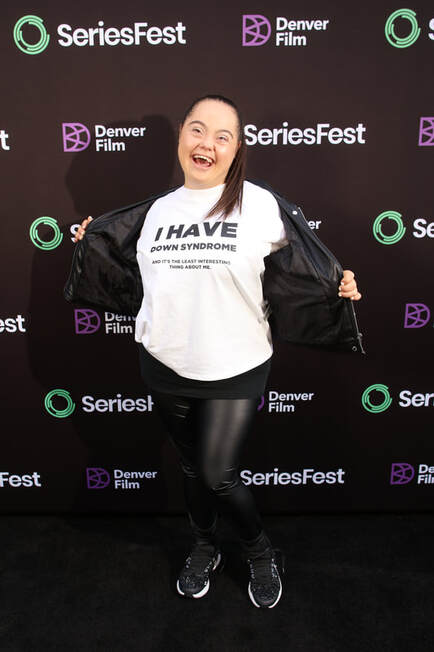 Actor Madison Tevlin at SeriesFest. Photo by Bear Gutierrez for SeriesFest. Actor Madison Tevlin at SeriesFest. Photo by Bear Gutierrez for SeriesFest. When SeriesFest announced they were doing a Panel about Actors with Disabilities in Hollywood, and how things needed to continue to change, I knew instantly I had to go and listen. While there, I got to speak with Canadian actor and Down Syndrome Advocate, Madison Tevlin. Not only is she active in front of the camera, but behind as well. Madison is a writer, aspiring director, and hosts her own show. She’s the epitome of positive vibes, keeping things real in an upbeat way. Her messages are about supporting one another and always taking the time to get to know someone before judging them. This profound actor was kind enough to sit with me and talk. Shae: To have a panel like this is groundbreaking and it was amazing. For you, what was it like to be on that panel? Madison: I like talking about positivity and diversity and inclusivity and making it in Hollywood. Just exploring our differences and celebrating them. Like I said, on the panel, I host my own show called “Who Do You Think I Am?”. And because of that show, it proves that everyone can do everything they put their minds to. Shae: I love that. So, tell me more about your show. Madison: It’s about people being people and who they really are. Taking things rather than at face value. So, when I made this show, I was working on other projects, and various other things. I didn't, I never really thought about talking about my experience, like my experience could be personally a hard topic to speak about. I wanted to prove people wrong. A lot of people are underestimated. They’re judged for being different, like me. People just want to be happy and have people get to know them. Be happy. Be kind. Be kind to everyone, you don’t know someone’s struggles. My show is about that. Shae: Just treat everyone with love, I love that. So where it can we listen to your show? Madison: Well, you can't really listen to it here, yet the platform is in Toronto. We're trying to pitch it so that other people can be able to watch it worldwide. Shae: Do you have more seasons of your show coming up? Madison: I have no idea. We will do more of it if possible. I want to continue being in movies, like I am in Champions, and doing… everything. Like public speaking engagements, and all of my public speaking, and I want to be able to work behind the camera, not just in front of the camera. I’m actually writing a script for number two for Champions, and get everyone together for a sequel again. So, me and Mike and Matt, who are really good friends of mine who's in the movie with me, Matt plays Craig, and we're actually writing a script together right now and we're in the process. Shae: If you weren't in front of the camera and you weren't writing, what other behind the scenes role would you like to fill? Madison: I’d love to direct and put everything in place and tell everyone how they're supposed to be. I’d keep everything organized in the way it would be fun. Shae: What matters most to you? Madison: Believe in yourself. The more you believe in yourself, and the more you think about things, and being true to yourself, that's what matters to me. Shae: I just love your positivity. It’s a breath of fresh air. Because not a lot of people are about the positive. They’re looking at the negative. Madison: I’m never about the negative, always the positive. Like I’m always on that side, all of the time. It just keeps me going and keeps me doing what I love to do. Shae: What got you into acting in the first place? Madison: I was 13 years old when everything started for me, I was on the show called Mr. D, the Canadian show. And this was something I didn't know I was going to do. I did not know this was happening for me. But then when I got this movie part, I was like, “Okay, this is a done deal. I'm going to be an actor I know exactly what I’m going to do for the rest of my life.” Getting into the movies, changed my life. I dropped everything down as a normal kid in high school. And I dropped all that down to be in this movie. And it felt so good. Also, thinking about all the nine boys in this, and me as the only girl, and so I feel empowered. When people watch this movie. That's what I want them to take away from this, the powerful message that we're trying to share. And it's based on us and what we are made of as friends. Shae: I love that your friends with them now and that you got to meet such wonderful people. Madison: Like Woody Harrelson. Like I never thought I would know him. And like now he's like… he made me become a better actor. Like he really helped me and pushed me and gave me advice to be a better one. And being out there in the spotlight and sharing what I have to share with the world. Shae: So, if you could give any advice to anyone going into this industry, especially anyone who is differently abled, what would it be? Madison: Go for your dreams. Go for your dreams, go for your goals. And just believe in yourself. The more you believe in yourself the more opportunities will come to you. No matter what path you take. This interview has been lightly edited and condensed for clarity. 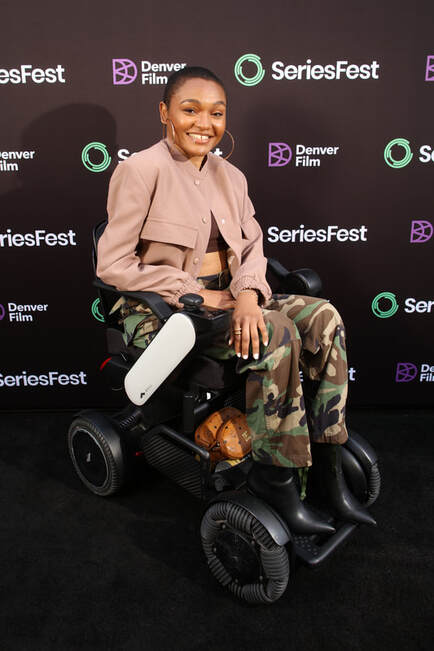 Actor Lauren ‘Lolo’ Spencer at SeriesFest. Photo by Bear Gutierrez for SeriesFest. Actor Lauren ‘Lolo’ Spencer at SeriesFest. Photo by Bear Gutierrez for SeriesFest. Lauren ‘Lolo’ Spencer took to SeriesFest to talk about the continued need for change within Hollywood and the film industry. Facing discrimination from a young age for her differently abled self, she has been fighting to make sure that stops. People are more than just their different ability, they’re people. We have likes and dislikes, good days, bad days, and sometimes the constant focus on someone’s different ability is hard to deal with. LoLo’s fight to be more than just someone with a different ability isn’t the only thing remarkable about her. She is also a notable actor and an author, with her talent reaching beyond it all at how larger than life she is. Shae: A lot of what you guys spoke to, hit way too close to home. Especially since, I was born in ’85. So, growing up in the school system, they tried to force me into different classrooms, like they did with other differently abled kids. Which I straight up ignored. Lolo: The same thing with me in high school. They were like, “Oh, well, now that she has a disability. She's supposed to be in these classes.” And my counselor and my mom, were like, “Lauren, do you want to go?” And I was like, “No,” and, and I think too, I think that's kind of part of what needs to happen, and the change that needs to happen. Because at that time, I knew nothing about disability. I didn't know disability culture, I know nothing. Right. So sometimes I feel like, damn, maybe I should have went into that classroom to like, promote some kind of change. But I didn't know anything at 14, you know? But I think that's the thing is like, we should be able to still feel confident and be like, “Oh, I'm about to go into class with other people like me,” or we can all hang out or the separation not even exist in general. Right. Um, just so we can all interact and have a good time. So, I totally feel that because I dealt with that as well. Shae: I feel a kindred spirit with you, how you talk about having a disability is really relatable for a lot of us. Lolo: Yeah. No, literally, it's a real, it's a real thing that people don't recognize, you know, and I think that's also where the fine line with wanting disability to be quote unquote, normalized is that the fine line between normalizing and then the sheer ignorance of it or the dismissiveness of it, and turning it into the butt of the joke, right? It's like the disabled, we're always the ones that have the butt of the joke. We're always being laughed at versus laughed with, you know. And so, again, we want to be normalized, but it's like, you're not clowning every single person for, whatever it may be all the time. It's a lot of levels to be worked on. So, I'm just hoping, like, the panel today helped. Shae: I think it definitely did help. And that is another topic I wanted to talk about. Yeah, I myself use humor as a huge coping mechanism. Because, if I'm going to be laughed at, I'm going to be laughed at because I've made you. Do you notice that you do something similar? Or people tend to kind of feel more comfortable crossing that line? Lolo: Oh, 100,000% I've always been a goofball. Even like, before my disability, but yeah, humor, comedy has all been my way of whether I knew it, or not, making everyone feel comfortable with my existence. It is something that you know, now that I'm getting older, and I'm better at understanding, disability and disabled culture, and ableism and all these different terms, is learning how to still use humor as the crux of my personality, versus the coping mechanism to make me feel better about the environment that I may be in. You know, and I feel like a lot of us probably do that, because we know that if we're not laughing, if we're not smiling, if we’re not goofing off, if I were to just sit still and daydream without doing anything. People go “Oh my god. I'm so sorry. I feel so bad. She's sitting by herself. She's not happy because she's not smiling.” Yeah, it's just like, I'm literally chillin’. I'm daydreaming about Michael B. Jordan right now. I'm not caring about what y'all are talking about. But if I sit still without a smile on my face, it's a next level of emotion that's created that doesn't even exist. Shae: Do you find that people project a different kind of emotion onto you? Lolo: Yeah, you just you, how do I word this? And I can't speak for everyone's experience but as a disabled person myself, yeah, I feel like I have to be on. On a certain stage so that everyone feels comfortable not only to be around me, but to talk to me like I'm a person. Shae: Do you find people often treat you differently? Lolo: You know, you can feel the energy when, like, people are saying certain things or complementing for reason. It's like they give the compliment, because they feel like no one else has ever complimented you ever in your life. So, there's like this next level of like, thanks. Appreciate it. But it's always that and you can always feel that intention off somebody. Why is it always condescending and not like, “Yo, I think your outfit is dope.” Shae: Which by the way, you look amazing. I love your cardigan! How do you think we could change how people interact with us? Lolo: As disabled people, we have to do better at also not using our disability as a way to have a conversation with other people as well. You know, we have to let go of our trauma stories unless the context of the conversation makes sense to bring it up. And if you're comfortable to bring it up. But I think we also too, as a community, we have to do a better job of making sure that we're not always only talking about our disability all day every day. Get it? You're a journalist, you know, I'm an actress. This is what I talk about. When I'm out at a bar or at the after parties or whatever that's going to be happening, disabilities are the last thing I want to talk about. Not because I don't want to talk about disability. But it's because there's so many things, I know I can talk about that it's like, I talked about that there. So, let's talk about this here. Because this environment, the context of this situation, feeds to talk about everything else except the disability. This interview has been lightly edited and condensed for clarity. 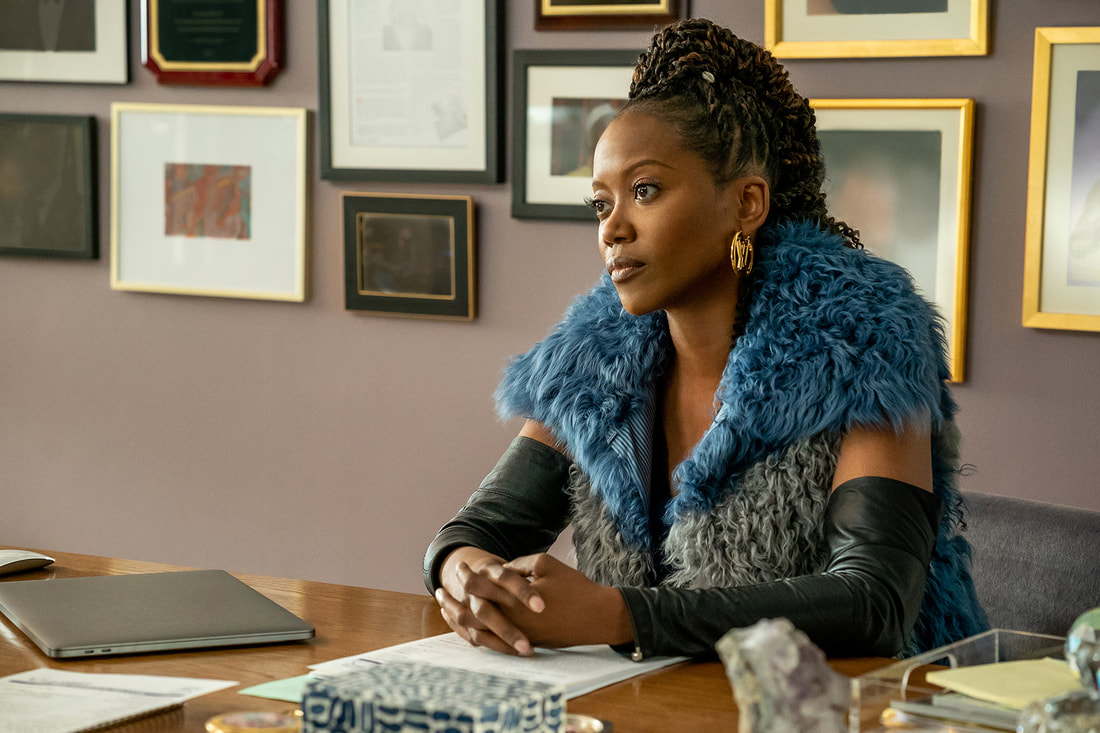 Erika Alexander is a highly accomplished actor that has appeared in a number of iconic films and shows throughout her career. Currently, she stars as Barb on the STARZ series, Run the World, and we here at NTG had the distinct honor of speaking with Erika to discuss Barb and the upcoming second season of this revolutionary show. John Betancourt: Now how you did you become involved with Run the World? Erika Alexander: Yvette Lee Bowser. Yvette Lee Bowser is the creator of Living Single. And she invited me to play this. And I was happy to be invited. John Betancourt: So, what was it that attract you as an actor, to Barb? Erika Alexander: Barb… is a life force. She is the… you know, the person that I think we all have in our lives in some way that is direct, can be brutal, but is fair and honest. She's also living in the moment. She's not just talking about it; she's being about it. And so, I really love that, because there's an opportunity to play someone like that. That's always fun. John Betancourt: And I couldn’t help but notice that Barb is something of the guide for this show, correct me if I’m wrong there. Erika Alexander: That’s the truth. She might guide them straight to Hell, but she’s gonna guide them. John Betancourt: I said guide, I didn’t say what kind. (Laughter from John and Erika.) But with that in mind, how do you as an actor get into the mind of playing someone like that? Erika Alexander: Um, I think all my life that I've been put in an interesting position to play really strong characters, I really have. And I have a background of having gone to Philadelphia High School for Girls. And I had strong instructors, male and female who told us that the world would not play pitty-pat with us, it was gonna… it was going to be sometimes you get hit, and we'd have to get used to it. And what were what were we going to do? We'd have to get up again, we'd have to be resilient. And I think that that's the kindest thing you can do to somebody is tell them the truth about life. And then they go out and get it and they go, “Oh, well, they did say it wasn't going to be easy. They did say that people may not take me seriously. And I'm just going to keep doing it. Because that's what I've been instructed to do. But that's what I'm designed to do. You know, that's what's in my DNA.” So, I'm really happy that I had some forecasting from good people. John Betancourt: Now in keeping with Barb’s role on the show, that puts her in a unique position in season two since she’s watching everyone deal with their respective journeys and goals. So, what would you say, Barb is searching for in season two? Erika Alexander: You know, I want to say that Barb is searching for what everybody is searching for, which is love and significance. To love and be loved. I really do. And it can look like ambition. It can look like career choices and goals and that type of thing. But everybody wants to have somebody think that they are essential to the scene. And she's found it in a way, they are becoming, she has arrived, she can tell them a little bit about the lay of the land. But she also has further to go herself. So, she's looking for their energy to, you know, embed in her so she can move forward. So, there's some reciprocity, and it's a generational conversation. But it's happening. John Betancourt: Now this is… a very important show through and through. What does it meant to you to be part of it? Erika Alexander: I love it, I would watch the show, even if I weren't on it. And that's saying something because you know, time is a beast. It's very important. I obviously was in a show that was similar many years ago about… actually this year, 30 years ago, and we didn't know then what it would become now. And I think it's like a little message in a bottle. You put stuff in there and people watch it in real time. And then you hope that it resonates. And this gives me another chance 30 years, again, to put another message in a bottle, in a similar place that I'm not the same but I'm in the milieu and I'm glad that I get to be around this really fantastic ensemble company. They are killers, the writing is complex and fun. And it's also you know, Harlem and the diversity of it, and the fun of New York. It feels good. It's pretty and its glossy. I love that. John Betancourt: In keeping with that theme of messaging, what do you hope audiences take away from a messaging standpoint this season? Erika Alexander: I think that people should not be so worried about the results or the outcome. That they've got to get on with life, that there's no guarantees. And it's okay to jump and not know, it's okay to make mistakes, and then get back on the road if that's what you want to do. But it's also saying, “You know what, I don't want to do that,” and turn back around or turn on a different path and move on. And so, I'm hoping that they can see that these people are actually making those things, real for them. And not because it's like a fake story or unrealistic. It's because it's very realistic to life. It's just that I think that people need to be reminded that nobody really knows anything until they know something. So, try it. Why not? John Betancourt: In keeping in that theme, what do you hope the audiences takes away from Barb’s journey this season? Erika Alexander: Oh, shoot, you know, Barb is in it to win it, baby, you know it, you hear me? She is there to show them the way, she's also there to learn a little bit. And be reminded, she gives a lot of advice out, she may think she's a life coach, that type of thing. But is she taking her own advice, she actually going out there and, and not just being the person who's done it, but the person who will continue to do it. And go over her borders. You know, it looks like she has none. But she does. She's very, you know, accomplished. And sometimes that can make you more stuck than you realize. So that's what I hope they see that Barb may, you know, get something from them too, to move forward. John Betancourt: So, we’ve talked a lot about the philosophical side of the show, but we need to talk about the comedy and the fun side of the show. With that in mind, what are you excited for audiences to experience, in general, in season two? Erika Alexander: Laughs. Fun. Embarrassment. I love when people are embarrassed in these types of things, they make mistakes, and they don't know what to do. Confusion may be too much of a good thing and you don't know what to do. You know, that can be weird. It can be weird to do it in front of your friends and still trying to fake… like, you know, what's going on, and you got it under control. So that's what I like. I mean, they're very accessible. The young women are bonding with each other and learning more about each other. And Barb is there in the mix. You know… having a cocktail, watching, watching the fireworks. (Laughter from John and Erika) John Betancourt: Now in talking to you, and your castmates about this show, there’s just been a real sense of fun from all of you. So, I’d be a fool to not ask what it’s like on set and what it’s like to work with this cast. Erika Alexander: You know, John… they suck. (Laughter from John and Erika.) John Betancourt: Perfect, there we go. Got the dirt. Got the tea. Erika Alexander: I really hate them. I hate those girls. (More laughter) But actually, it's you know, it's very close, is very close, they keep a tight ship. And we run really hard. And you know, the crew, you know, we still have, you know, COVID set rules, and everybody abides by them. But it gets done. Obviously, you've been in the business a long time, so you know that everything's on a deadline. And the best thing that you can do is do your best, but also to do it with people that you like, and, you know, have fun doing it. That's like a bonus. That's not a given. And that is exactly what's here, not only in the show, but also the crew in New York. And everywhere we go. It is just absolutely welcoming. And it's also a testimony to what Americans have built in the landscape of entertainment, that we built these fictional sets that can coexist with real life. I love that. So beautiful. John Betancourt: Last question I have for you today, what are you most proud of when it comes to your work on this show? Erika Alexander: Friendship, long friendships that remembered when they created something, to invite someone that they hadn't worked with, in quite a while, nearly 30 years, to the party. And I think that speaks to the value of the work but also the longevity of perhaps how I participated and what I contributed to. And so, I'm really proud that my contribution as an actor and as a person makes people remember that when they're making something that they should perhaps invite me along to the party. This interview has been lightly edited and condensed for clarity. 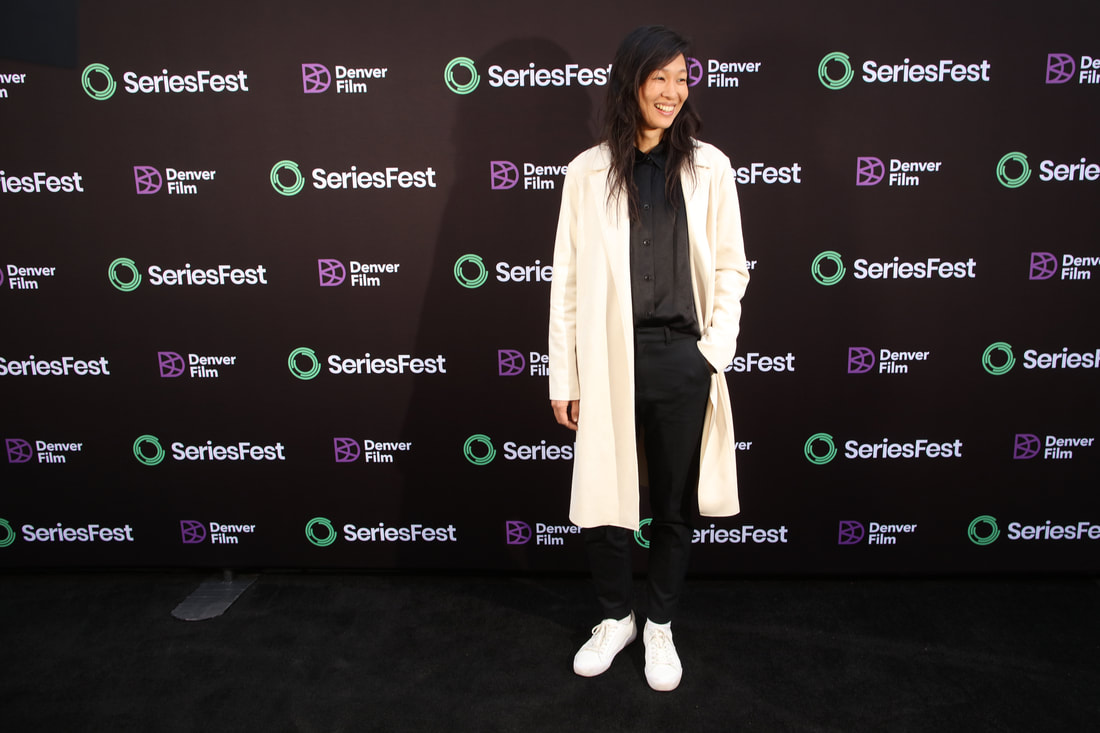 Actor Sue Ann Pien at SeriesFest. Photo by Bear Gutierrez for SeriesFest. Actor Sue Ann Pien at SeriesFest. Photo by Bear Gutierrez for SeriesFest. During SeriesFest Season 9, I got to sit down with Sue Ann Pien, a wonderful actor who is open about her Autism. In the world of differently abled, voices matter. Pien is working hard to ensure her voice is heard and to destigmatize Autism. Many of those who are neurodivergent are incredibly talented and overlooked because they do not fit in with societal norms. Pien is only one of a handful of actors who are out and open about their Autism and the struggles of being differently abled in Hollywood. I connected with Pien and her openness, her passion for equality, and her drive for everyone to be treated right. After all, we are people, we are human, and while we may express ourselves differently, it does not make us less. Shae: What was your main inspiration behind being on this panel? Sue: That's a great question. It's been quite a journey. You know, being in that as we see it and talking about autism, bringing all of these enlightened conversations to the forefront of entertainment. Right. That's incredible. And so, one of the main things, like I said, I am also creating, I'm directing a short film and I want to use all the talent. Especially since I've met so many people that were incredible on the set. I want to put them to use again. We have two producers, one of them is Darren Dean, he's a producer on Tangerine, an award-winning show. Also, The Florida Project and, Willem Dafoe was nominated for an Oscar in that. So, I have some big heavy guns. You know, Suzanne Ellis is the president of Beacon pictures and worked with Kevin Costner, Mila Kunis, and these guys are literally like I was talking about on stage, they want to make sure that people we have neurodivergent creators behind the scenes to really employ a vast spectrum of talent. I want to be a voice for that. I want to get that stuff out in the world. Like Bella, my lead actress who wrote the short film, she has two siblings and they’re both on the spectrum, they're very different. One, Alex, is an animator, an incredible animator, but he speaks like he’s in a cartoon, so you wouldn't even know when you met him. You're like, “Oh, that's just some autistic kid.” And then you watch how he draws, and you're blown away by his talent. Like, I don't know if I could draw. But the social stigma around him, and he's not going to have a normal conversation with you. But I speak that language, so it's fine. Shae: That is amazing. Thank you so much for being that voice. I have cousins on the spectrum. One of them is also a talented artist, and people have this stigma of people on the spectrum of looking down at them for acting different. To be a voice to that to say, “there's nothing wrong. I'm just a person. Treat me as such”, is absolutely wonderful. Sue: Yeah, it's weird, right? It's so weird. I mean, it's almost like you're in this group of people that you know, and throughout history, we've seen this right? You see, like, with the racism, with all of this homophobia, with xenophobia, so it's just another element of that except it applies to people who are differently abled. Shae: It does apply to differently abled, for sure. To have that voice, to speak to multiple people across… because that's the thing about being differently abled, right? Like we aren't just narrowed down to one race or gender or anything, we're across an entire spectrum of humanity. How do you feel about able-bodied actors playing the roles for differently abled people? Sue: That is definitely an unpopular thing to do. Here's the thing that we're trying to do, we're trying to give people who have not had the opportunity to even get seen, to go out there and earn a living doing what they love. Like, I want to see these actors step out of the way, and let the Autistic person get the Autistic role or the person who is actually Black get the Black role. Just like… give people an opportunity. Shae: When I ask people that question, it is different when you're on the other side of it, because you're like, on one hand, yes, it's getting us visibility. But on the other hand, it's taking away opportunities from our differently abled actors. Sue: We just talked about this; my agent was asking, “When are we going to be competitive?” You know, like an able-bodied regular person? I don't know if you know, they're getting like 20 Auditions a month, right? So, they're, ready to go, people know them, right? They have the connections, the casting directors have seen them, their agents are pushing them. And then you have somebody in a wheelchair who gets one audition a year. How is that person going to go anywhere near a common additive role? Right, you have to you have to shut the pipeline down and be like, open up the doors, let them all come in. This interview has been lightly edited and condensed for clarity. SeriesFest Season 9 Conversations: Michelle Sie Whitten from The Global Down Syndrome Foundation5/24/2023 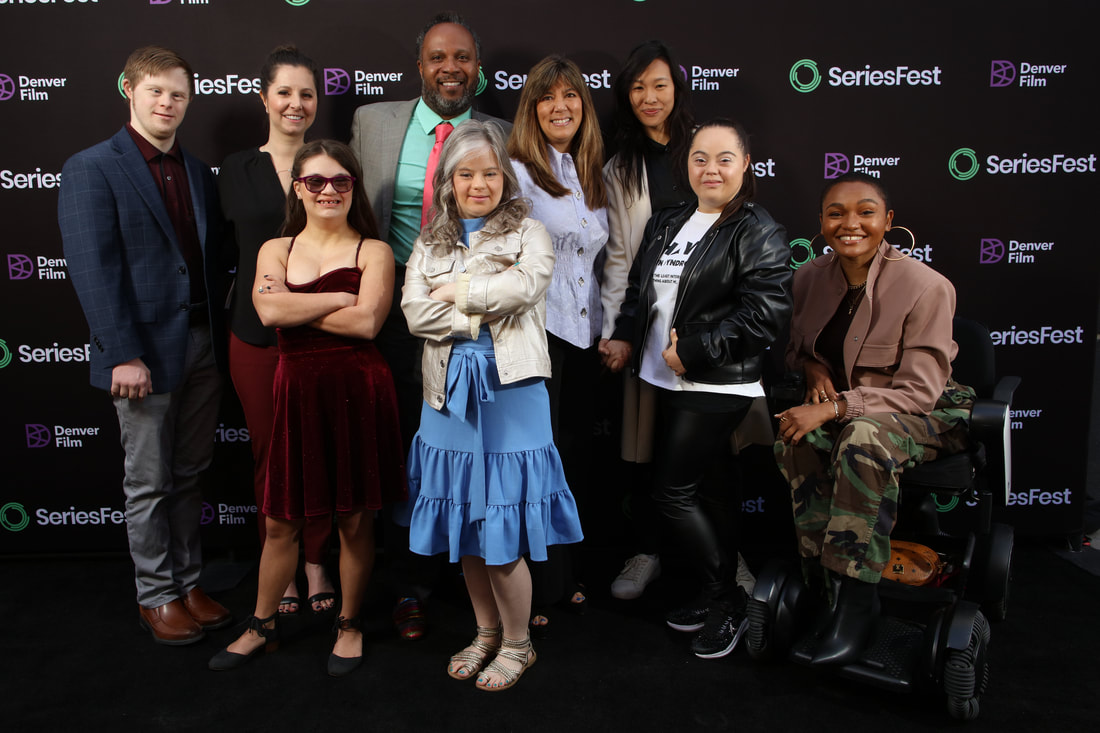 Photo by Bear Gutierrez for SeriesFest. Photo by Bear Gutierrez for SeriesFest. I recently sat down with Michelle Sie Whitten at SeriesFest Season 9. Michelle is the President and CEO, and Co-Founder of the Global Down Syndrome Foundation. Michelle was not only a dream to talk to, but very insightful in her drive for a better, more accepting, and more accommodating world. Her work with the Foundation and SeriesFest is paramount to the future success of both. Her passion for the Global Down Syndrome Foundation is only second to her drive for its undoubted success. Thank you, Michelle, for speaking with me. Shae: This was probably my most favorite panel you guys have ever done. I personally am legally blind, and I'm trying not to choke up. But this was one of the most amazing things I've ever gotten to see. What was the main inspiration for putting it together? Michelle: Well, I think on the one hand, I'm a cable baby, I grew up in the industry, very close to Denver film. And actually, Mike Fries is the one who introduced me to Randi at SeriesFest. So, I’m a big fan. Then also I started the Global Down Syndrome Foundation and my oldest child, Sophia, who's going to be 20, oh, my God, in June, she happens to have Down Syndrome. So, I created the global Down Syndrome Foundation to really advocate in DC for equity, in research and medical care. It was just shocking to me what was being done in that regard. And our whole goal at Global is to elongate life and improve health outcomes. But we're doing that so that people can live long and wonderful lives, which can’t happen if we don't have inclusion in school and employment. And yeah, employment in Hollywood as well. Shae: That’s very true. There's not a lot of opportunities. You don't see a lot of people on the big screen or even the small screens or behind the screen with different abilities. Yeah. That is absolutely wonderful that you're doing that. Michelle: Well, I liked how the panel started and had the audience started to use the word, varied-ability. Shae: I was too, because as someone with a varied-ability it is very discouraging to hear the word disability all the time. Michelle: Oh, sure. I know that disability advocates in DC are like disability this, disability that. But we like, for especially new families, like “differently abled” just seems like such a more inclusive way. Talking about people with disabilities, whether that be intellectual or physical. We're very excited. You're the third person now, as I walked out, to kind of get teary-eyed about this panel. And it just speaks to this moment in time where it is common, where it is expected. And a lot of people are taking it seriously. You know, my fear, of course, is that, we don't ride the wave, we don't ride the momentum, and we don't stick it at higher levels, and maintain it. I do think we need to be aware that we're in a renaissance. And we're riding this wave. But if we're not strategic, and intentional about it, and we don't advocate right now, for more, it may come and go. Shae: I completely agree with that. You see things in Hollywood, changing drastically. And it happens overnight. But if you're not right there in that moment, you do lose the potential for it. Moving forward, how do you plan to continue riding that wave of change? What are your future plans? Michelle: Well, you know, there’s the Anna and John Sie Foundation, which is my beautiful parents’ foundation that they started. Shae: It is an amazing foundation. Michelle: Yeah, I mean, my dad is just so brilliant, and really was a maverick in the cable and film industry. And my mom was a partner in that journey. And now they're older and have health issues. So that's really difficult. But there's so much I want to do in their honor, but also in honor of my daughter. For the Global Down Syndrome Foundation, it's really sticking the landing on elongating life and improving health and the like, and then whatever they want to do will be so much more accessible. There are so many others I mean, think about Special Olympics, all these other organizations paying it forward in other areas, and now I know about SAG AFTRA, which I didn't know about until this panel and so many people are carrying forward in so many areas and fields of disciplines. My hope is that we're just a small piece of that when it comes to people with Down Syndrome and their health. On the other hand, as the Anna and John Sie Foundation, I do feel like creating this modest beginning, funds that will help provide funding for people with varied-abilities. So, if we could just in a modest way, do that, and attract others who are interested in joining us and doing that then I think it's a game changer. It's an expensive industry. It's a difficult industry, it's a very competitive industry. Shae: That's very true, funding is important, especially if you don’t have the resources and are differently abled. Michelle: I mean, it's hard for anybody but giving more opportunity, putting money for that opportunity, and letting brilliant people behind and in front of the camera shine, will help pay it forward tremendously. Because there's so many great actors and producers and directors who have disabilities. This interview has been lightly edited and condensed for clarity. 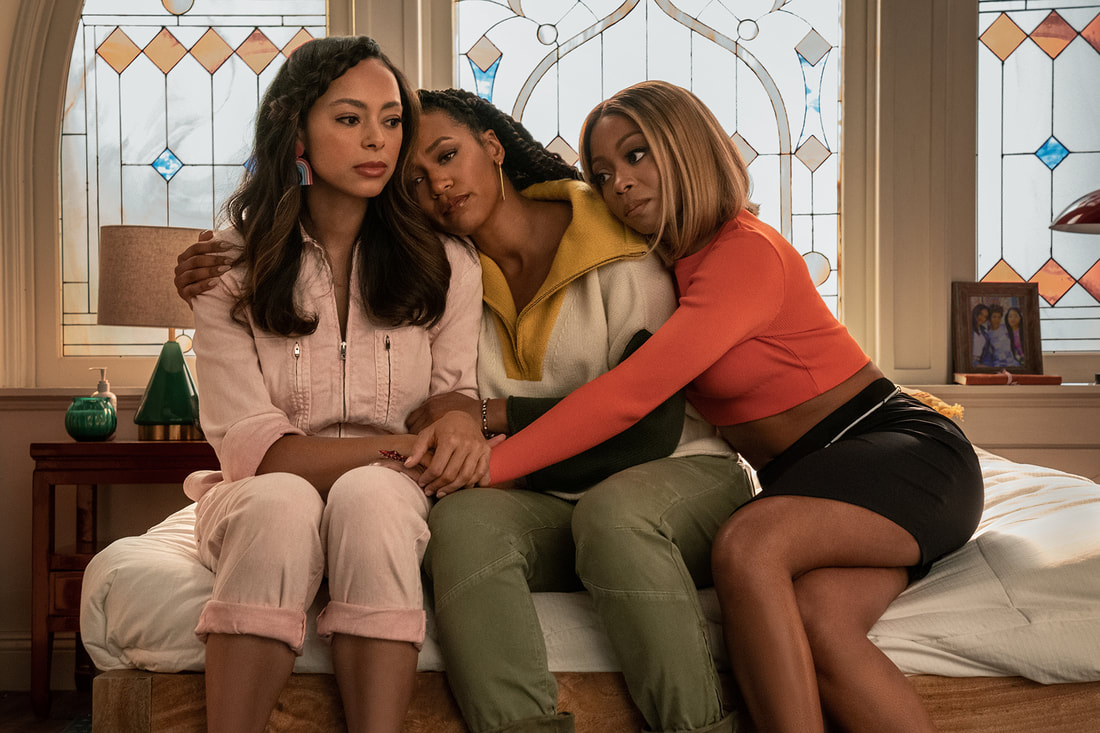 Amber Stevens West, Bresha Webb, and Corbin Reid are three highly accomplished actors that have dominated the silver and small screens over the past few years. Currently, they star as Whitney, Renee, and Sondi respectively on the STARZ series, Run the World, and we here at NTG had the distinct honor of speaking with Amber, Bresha, and Corbin to discuss the upcoming second season of Run the World, and more. John Betancourt: What has it meant to each of you to be part of a show that is so extremely important? Amber Stevens West: Oh, thank you. It means everything. Authenticity is what we need to have in storytelling. So, we have a show that's run by women and told by women and starring women, and I think that matters. So, I'm really grateful to be a part of that. And the representation means a lot. I didn't grow up with a lot of people on TV that looked like me, other than Ashley Banks. (Laughter from all) So, it's really cool to see that we are given a platform to tell this story, because there are so many different ways to be a black woman. Corbin Reid: Amen. Bresha Webb: Mmmhmm. Corbin Reid: I would say, similarly to Amber, just knowing the impact that being authentically represented can have at large, like, it's wonderful to get to play those characters. But the part that has really mattered to me the most as an actor, is having people come up to me on the street and tell me how much it means to them, and how it's like, you know, it means the world to them. So that has been really wonderful. I think it's easy for black woman to get troped in television as sort of one note, and we're playing really complex characters. So, I think it crosses all the boundaries, and is super relatable and super authentic, and is having a really wonderful impact. Bresha Webb: Um, it's really just awesome to be on an aspirational show. You can look at the fashion and be inspired. You can look at the friendship and the sisterhood and be inspired. You can look at their careers and their choices that they make and see how you would walk it out differently, or if you would do it the same. I feel like a lot of shows that I grew up watching, I was impacted by you know, because I'm like, “Oh, my God, look at the choices that she made. And am I going to do that? Would I do that in this situation.” So, it's awesome to see women living their truth, boldly. And, you know, and authentically, like you both have said, you know, it's just great to see strong women who have a foundation in their careers, and they're still figuring things out, you know, looking like you have it all together, ain't all that it's cracked up to be. So, it's a great reflection of seeing that on the screen with these women. John Betancourt: What would you say your characters are ultimately searching for in season two? Especially after how season one ended? Bresha Webb: I think, I think Renee is searching for her own success and success, in many ways, success in her careers in this new path that she's chosen, success in her love life, if that's what she wants at this time, and also success and just being who she is and the choices that she's made. And I think that's her path of just trying to walk that out, walk out the choices that she's made, and to find her confidence in it, and to do what she wants to do. And what does that look like when she follows her heart? And doesn't care what other people say or have to say, you know, she just is figuring her life out for herself. Amber Stevens West: I think ultimately Whitney is learning the same lessons and walking through the same challenges but with a different scenario. She's also trying to put herself first or needs to put herself first because she's now realizing that she blew up her entire relationship and her life because she wasn't putting her needs, first. She was worried about the relationship looking successful, and that wasn't listening to what she really needed. So, she's very much confronted with that this season, which I think we can all relate to in some way. (Laughter from all) Corbin Reid: In the second, or was it first episode, “No matter how we move or when we move, there's only one direction, straight ahead.” And I think that is definitely a sort of mantra that we all follow in this second season. I think for Sondi she is making moves on feelings that she's sort of suppressed in terms of feeling taken for granted, or, you know, really putting her needs and wants on the backburner. And in season two you see her take her life by the reins and have the courage to make decisions that serve her and serve her needs and her wants and what's best for her while obviously, lovingly respecting the situation that she's in, which is a very hard thing to do for women in general. And it takes a lot of courage. And it's fun to watch a woman sort of leap headfirst into serving their wants and their needs and seeing how great that outcome can be. If you take that chance. John Betancourt: Last question I have for all of you today, what are you most proud of when it comes to your work on this show? Corbin Reid: I'm most proud of how authentically we are representing this diverse group of women. And I think a lot of that comes down to you know, for example, we have seven of the eight directors on our show are women this season. So, you know, the show is for women by women. The showrunner is a woman, our executive producers are women, women of color, are a lot of our executives are women. And we're obviously three black women who can really relate to our characters as well. But I just think that the complexity that these characters are written with, because there are so many people up and down the line, who understand them, at their core, is very exciting for us to play as actors, but also very exciting for the audience to watch. So, I'm very proud to not be playing a trope and to be playing a complex character that people can relate to across the board. Amber Stevens West: Yeah, we are dynamic women. And that is what we show on the show. And there's a lot to be proud of because of that. Bresha Webb: And showing real sisterhood as well. You know, with a lot of shows on television, you can get a lot of negativity and women not really supporting each other or envying each other in their lives. It's great to see women supporting women and being honest with each other and vulnerable with each other and having a safe place to fall. I think that's aspirational. And inspiring. This interview has been lightly edited and condensed for clarity. 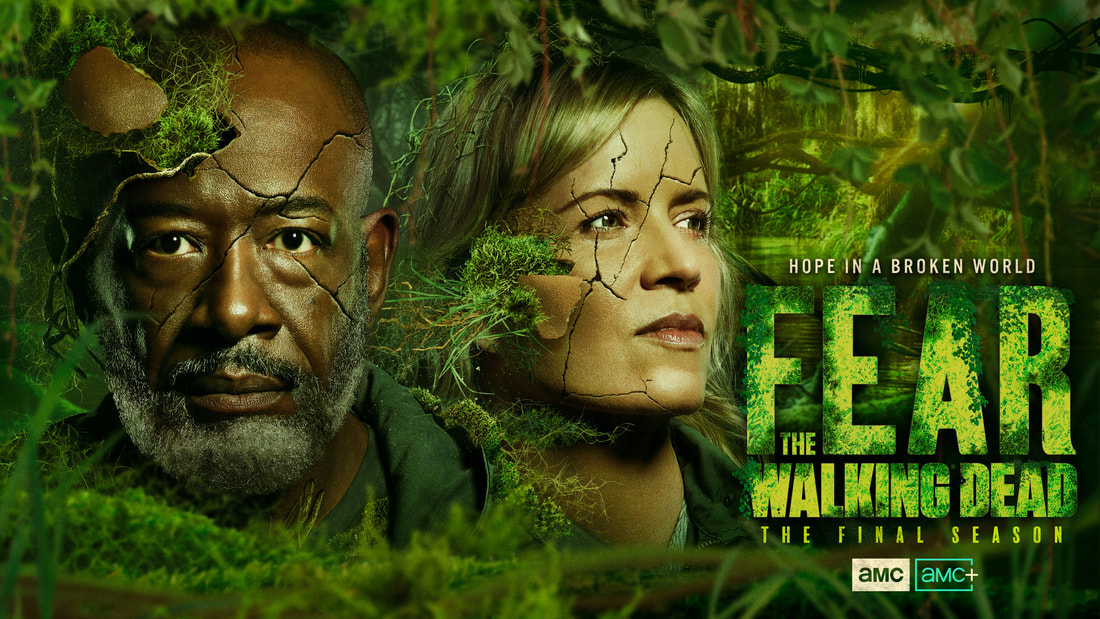 We are but days away from the beginning of the end of the AMC series, Fear the Walking Dead. For Sunday will bring forth the eighth and final season premiere of this storied first spin-off in the TWD Universe and well… to properly say goodbye, we here at NTG had the distinct honor of sitting down with the cast to discuss years of memories. But there isn’t enough time in the day for every single story in that vein… so we instead narrowed down our discussion with Kim Dickens (Madison Clark), Danay Garcia (Luciana Galvez), Rubén Blades (Daniel Salazar), Christina Evangelista (Sherry), Jenna Elfman (June Dorie), and Karen David (Grace Mukherjee) to two key questions to properly reflect and summarize the journey as we all prepare to bid farewell to this bold and dynamic series. Kim Dickens, Danay Garcia, and Rubén Blades John Betancourt: What has this incredible journey meant to all of you? Kim Dickens: I think, you know, I've said this, I think I said it at WonderCon. I said it… the day I wrapped. But this job has really been profound for me. It has been -- I've never led a show, as I did for the first four seasons, I never have been on a show for this amount of time. I've never been so challenged personally and professionally. And I've never been so rewarded by a role in a job. And I, I really felt like when I got the role of Madison, I felt like everything I'd done, in my life, every class I'd taken, every job I'd done, everything sort of led me to that role. And, and I felt so fortunate. And so, for it to have lasted as long as it has for us… it's just been… it's been profound. It really has -- so much has happened in our lives. We've grown professionally and personally; we've created this family. That's… that's phenomenal. And it's emotional to let it go. But it's it feels right. I think we all feel good about it. Danay Garcia: I was listening to Kim, and I felt the same. I… when I joined the show, we were in Mexico, it was a different landscape, it was a different country. It was, you know, it felt like so long ago, but we were there, we were together, and we were there from day one. And then you know, the last season we finished in Georgia in Savannah, it's like another landscape another struggle, like the struggles to deal with the days and the heat and… but at the same time looking at each other, we are… we're still together. We're still here. And, you know, for me it was… I didn't realize how important it was to finish with Kim until she showed up. I didn't realize when she left, what a hole she created. But I didn't… you know, it's like a kid you grow up, you're like, “I'm gonna be a big girl,” and then mom comes and you’re like, “Oh, I really would like your help!” And she really filled that in. And also, we were in Savannah, which is like a new place that all of us kind of reunited for the first time. So it was weird that, like, you know, I've never been to Savannah, I don't know if Kim has been to Savannah, I know Rubén hasn't been, like, it was just this middle ground of us, of us finding a spot to live and to eat and just kind of like, it felt really interesting to kind of like reconnect in a middle ground place, personally, and as an artist, you know, just seeing those faces that, you know, you started this big job with, it meant so much. And I felt so grateful to be part of that, for my journey as an artist and I felt like this job has prepared me for so much in the future. Definitely I learned that, you know, nobody's gone until they're gone, for real! (Laughs) And even though, really like, it's crazy, and, and that, you know, there's always room for surprises. And this is this kind of career that just never stops surprising us really, never, just never stops. Rubén Blades: Well, first of all, it took me out of unemployment. That's, that's very good. (Laughs) Secondly, as an actor, I thought… it’s a dream of every actor to play a character that does not correspond to you, to your own self. And the possibilities of, of Daniel Salazar, were like, a constant source of, of challenge and amazement, because there was this person that has nothing to do with me, the way I am, the way I usually act and think, and yet I had to find a way to, to understand the character and to, to bring out of whatever lines I've been given the humanity of the character, in spite of the fact that it was somebody that in real life, probably we would have not been friends. And every single time, every single time that I worked, and throughout this eight seasons, there was always a discovery for me. That's the thing about acting is it forces you to, to acknowledge things about yourself or about other people that you probably ordinarily wouldn't address. As far as everybody I mean, I'm super glad that Kim is back. And with us, at the end of the of this eight seasons, I mean, I… you know, I'm not gonna get into… when she left, it was a surprise for me. So I was, I was very, very happy that somehow it worked that she could come and finish with us what we started. And so that's one thing that made me very happy… that she came back. Christine Evangelista, Jenna Elfman, and Karen David John Betancourt: What are you all going to miss the most about working on this show?
Jenna Elfman: Well, there's a lot. Christine Evangelista: There's a lot. Jenna Elfman: You go first. (To Christine) Christine Evangelista: I am I really, I'm so grateful to have done, have worked on an action-drama series. I really love the physicality of the show, and how it really pushes ourselves to limits I didn't even know that I was able to go to. I really love the physical nature, aside from all the people that I worked with, who I will miss, truly, truly miss. I really love the physical element of the show. I think I will definitely miss that... that part. Jenna Elfman: I came away from completing the season feeling like I had, like I was a bodybuilder and an actor. Like I had so many new muscles that were like in prime shape. Because of how many aspects are involved in telling the story from our job, like Christine said, with the action props, just maintaining the awareness of the mythology, the elements that we are in, the deep layers of story and character transitions and connecting all of that on a personal level, maintaining it throughout the days, weeks, months. You know, I didn't realize how much June lived in me, you know, even when we would be on hiatuses, but I knew another season was coming up I would have about maybe two months of kind of a break, from her, before the scripts came in. This season just… I started reading the scripts and my husband took the dogs for a walk. When we were… this was about a year ago or yeah, maybe around June last year. He came back and I was like “Okay, time to work on the scripts, they’re coming in.” And I sat with the script for like an hour while he was taking the dogs for a walk and he came back in and I started making lunch, and he was like, and we, you know, had a great day. It was all fine. And he was like, “Are we good? Are we okay?” And I was like, “What are you talking about?” He's like, “Your whole face, like, did I upset you? Am I in trouble? Did I do something?” And I was like, “I don't know what you're talking about.” I was like, “Oh my god, I started working on June.” (Laughter) And, you know, I didn't realize how much she was inside of me until we wrapped the series. And I conscientiously and ceremoniously mentally sent June off to a vacation cabana. I had to actually send her away, lovingly. I didn't need to say goodbye or anything, but I had to say, “You go, you're going over there now.” And I felt this tremendous shift in my mental state. In my own new mental universe and spiritual universe. That lightened up quite dramatically. Christine Evangelista: I saw that. I could definitely testify when I saw you like, however, whatever, a month or two later, I was like, you looked visibly lighter. Like, lighter, I was like, “Whoa, like, you look different.” You felt different to me. Jenna Elfman: Yeah. I felt like my whole kinesiology changed. It was crazy. So, I think I… I'm going to miss that phenomena, you know, that occurs? To me… it was I'll not miss it. And I'll miss it. You know, I'm enjoying feeling lighter. But yeah, just how consuming that gives a tangible sensation. That's, that's very stimulating. Karen David: I can totally relate to all of that on so many levels. with Grace. I mean, before coming into The Walking Dead Universe, you know, I was doing Galavant, and singing, you know, musicals, dancing with horses, and doing Once Upon a Time and all of that, which was very different. And what excited me, besides the fact that I could actually be only 15 minutes in the hair and makeup chair and just have dirt and blood and gore on me-- Christine Evangelista: It’s great actually. Like that is so liberating for a female actress, you have no idea. Karen David: Here’s a job that if you're going to detox and break out, fantastic! Because the worse you look, the better. Yeah, it just added more to your character, which was great. I didn't freak out at all, I'd be like, “Yeah, bring it on!” You know, they could cover up make it look like dirt. Even better. There's so many things. You know, which the girls are talking about. (Laughter) But also, as Jenna said too, its, there is this energy that you know, when you step into the shoes of your character, it's… it's there, it's palpable and the same for Grace, too. She's had a very painful journey and a very, very sad life. And to take that on, you know, it's… it is a lot. But as Jenna said, it is this magical phenomena that lives within you. And for me, the hardest bit was, was when we finished filming, it was breathing her out, which was really, really tough for me. Because she's been a part of my life for five years. And I was sent two weeks ago, I received Grace's boots. And I didn't know. And it was in this box. And I opened this box, not knowing what they were. And they were Grace’s boots. And I cried, I just burst into tears, I burst into tears… of relief. I burst into tears with gratitude. And of you know, all the things that playing her has taught me and what being on the show has meant for me. It was just such a mixed bag; I think because I just wasn't expecting it. And it was right there. You know, and just all the feels, you know, just so palpable and so alive that are still alive in me and being so forever connected to Grace, forever connected to the cast and crew and, and the writers and creatives and, you know, it's… it's here, it's here in my heart and it lives and it breathes, but it's also taking that time as Jenna said to.. to let it… let… let her go. And, you know, I'm still doing that. You know, I have and it's still a continuation that you know, she's there. But my husband said well, because we've just come off the back of… and the girls know this. I think everyone knows this; I've survived a two-year remodel. And we’re still married, and we still like each other which is great. And so, we have the boots and I have to find a place in my office now to hang these boots. Because there's so much just looking at these boots that are so symbolic of my time with everyone and with this character that I'm so deeply and forever grateful for. This interview has been lightly edited and condensed for clarity. |
Archives
April 2025
|
|
© 2012-2025, Nerds That Geek LLC.
All Rights Reserved. |
uWeb Hosting by FatCow

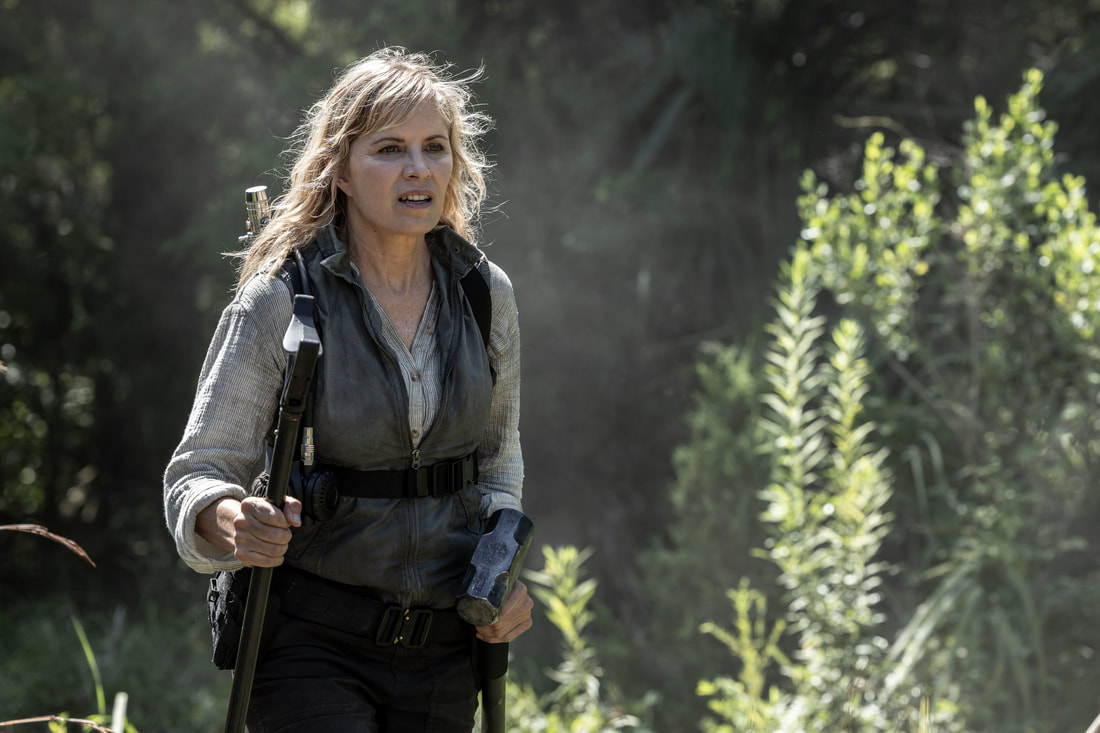
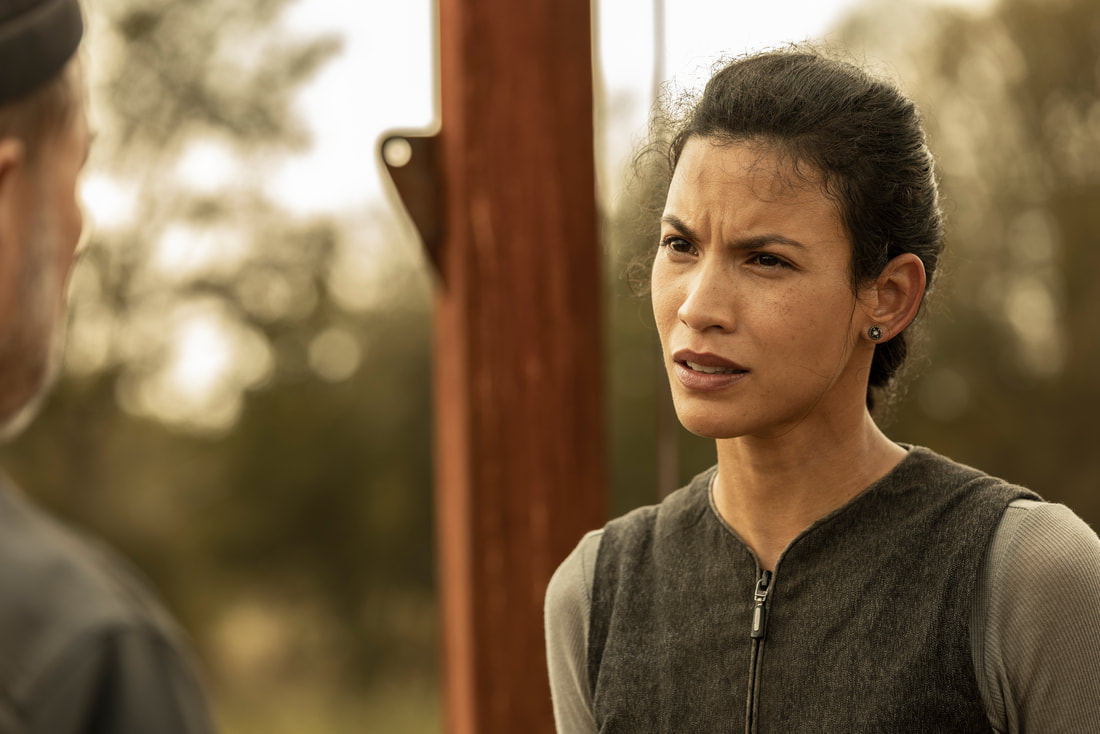
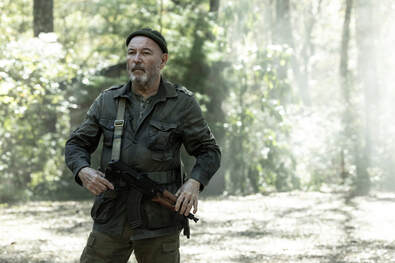
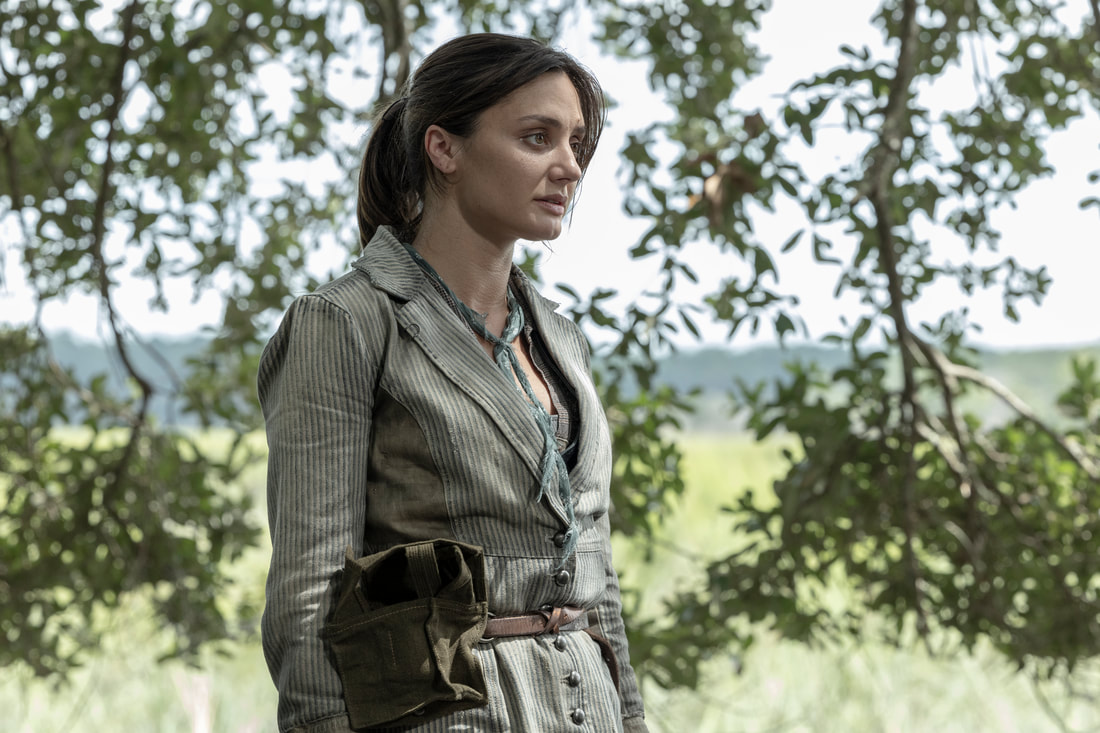
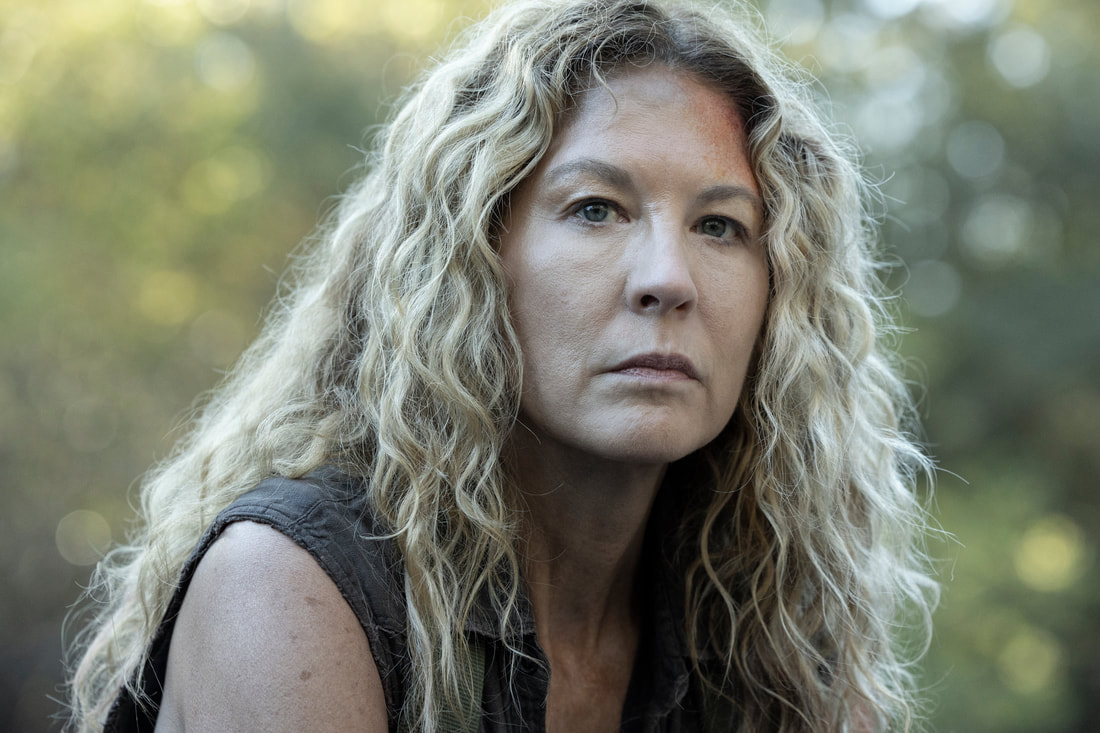
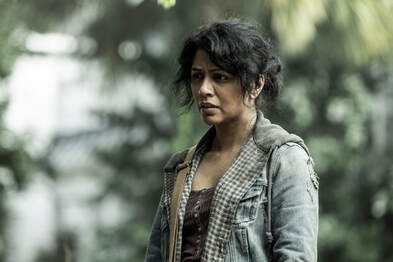
 RSS Feed
RSS Feed